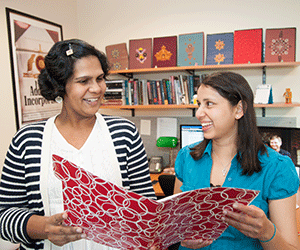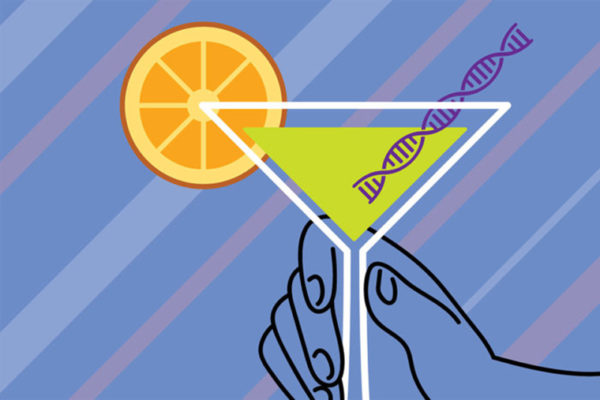Young adults with autistic tendencies don’t often engage in social or binge drinking, but if they drink, they are slightly more likely than their peers to develop alcohol problems, according to new research at Washington University School of Medicine in St. Louis.
The findings were published recently in the Journal of Studies on Alcohol and Drugs.
The researchers did not study people with autism. Rather, they wanted to know whether traits linked to autism, such as social-interaction difficulties, communication challenges and a tendency to engage in repetitive behaviors, put people at risk for alcohol and other substance-use problems.
“Drinking to intoxication is a social activity that is more likely to occur in a group,” said first author Duneesha De Alwis, PhD, a postdoctoral fellow in the Department of Psychiatry. “People with autistic traits can be socially withdrawn, so drinking with peers is less likely. But if they do start drinking, even alone, they tend to repeat that behavior, which puts them at increased risk for alcohol dependence.”

De Alwis and senior investigator Arpana Agrawal, PhD, associate professor of psychiatry, studied 3,080 Australian twins and assessed their responses in interviews and questionnaires to identify symptoms related to attention-deficit/hyperactivity disorder (ADHD). These symptoms include inattention, difficulty concentrating or always being “on the go.” They also assessed traits frequently seen in autism spectrum disorders.
“There seems to be a strong genetic overlap between ADHD and autism,” De Alwis said. “And it’s very common for people with ADHD to have autistic traits. These individuals may not have an autism spectrum disorder, but they typically score high on measurements of autistic traits.”
In addition to alcohol problems, the researchers analyzed the twins’ nicotine and marijuana use, finding that people with more ADHD symptoms or autistic traits also were more likely to smoke cigarettes. Those with more ADHD symptoms or autistic tendencies also were more likely to use and abuse marijuana, and the risk increased with the number of symptoms a person had.
For example, just under 37 percent of those with no ADHD symptoms smoked regularly, but among those with three or more symptoms, 51 percent reported regular smoking. Only 16 percent of those with autistic traits were regular smokers, but like those with more ADHD symptoms, the smoking rate among those with six or more autistic traits was 51 percent.
Regarding alcohol dependence, just under 20 percent of those with no autistic traits met the criteria for alcoholism. The percentage of alcohol-dependent people among those with six or more traits was 35 percent. For marijuana, about 23 percent of those with no autistic traits reported smoking pot more than 10 times in their lives, but 39 percent of people with six or more traits had used marijuana that often.
“That was a surprise,” said De Alwis. “We expected they would be less likely to use marijuana because people at greatest risk for autism spectrum disorders often are reluctant to take risks and typically take steps to avoid harm.”
Those with more ADHD traits were more likely to engage in social drinking and to drink until they were intoxicated. Those with autistic traits didn’t do either, but if they drank at all, they still had an elevated risk for alcohol dependence.
“Binge drinking, for example, might happen in a very developmentally limited fashion,” she said. “People are most likely to binge drink during college. Then they mature and go on with life. Someone who is more socially withdrawn may not engage in that sort of drinking, but he or she may have an escalating pattern of drinking that leads to alcoholism.”
Smaller, clinical studies of individuals with autism have reported very low rates of drinking and substance use in people with autism spectrum disorders, especially when compared with people who have other psychiatric disorders. So why did this study find elevated risk in people with autistic tendencies?
“It could be that people with just a few autistic traits have an increased risk of substance-abuse problems, while those with more traits are somehow protected,” Agrawal explained. “For this study, we clumped all of these symptoms together. In future research, we want to look at how individual traits — like repetitive behaviors or being withdrawn socially — may influence risk. It could be that some traits related to autism are protective, while others elevate the risk for alcohol and substance-abuse problems.”
This study was funded by the National Institute on Drug Abuse (NIDA), the National Institute of Mental Health (NIMH), both of the National Institutes of Health (NIH), the Australian National Health and Medical Research Council and the McDonnell Center for Cellular and Molecular Neurobiology.
De Alwis D, Agrawal A, Reiersen AM, Constantino JN, Henders A, Martin NG, Lynskey MT, ADHD symptoms, autistic traits and substance use and misuse in adult Australian twins. Journal of Studies on Alcohol and Drugs, vol. 75 (2), pp. 211-221. March 2014.
Washington University School of Medicine’s 2,100 employed and volunteer faculty physicians also are the medical staff of Barnes-Jewish and St. Louis Children’s hospitals. The School of Medicine is one of the leading medical research, teaching and patient-care institutions in the nation, currently ranked sixth in the nation by U.S. News & World Report. Through its affiliations with Barnes-Jewish and St. Louis Children’s hospitals, the School of Medicine is linked to BJC HealthCare.


